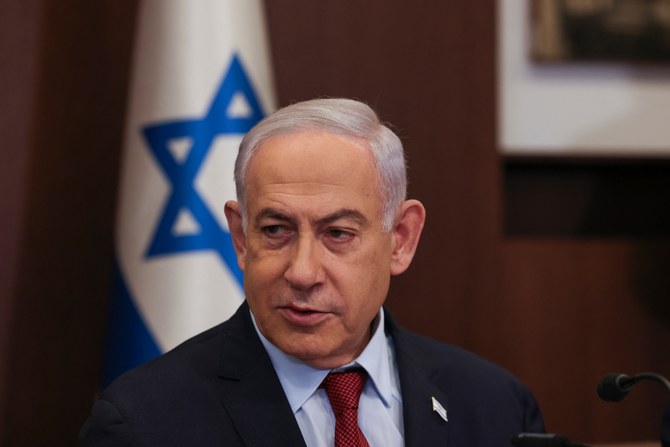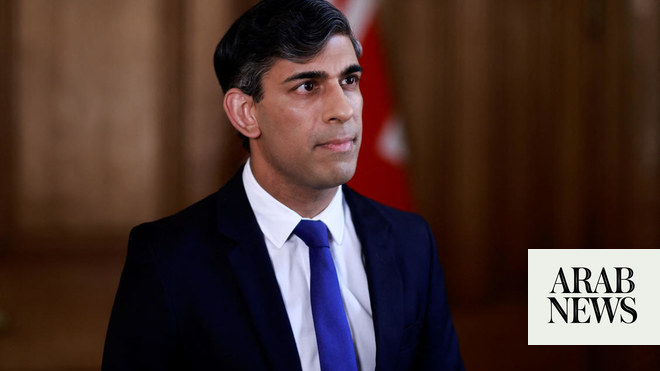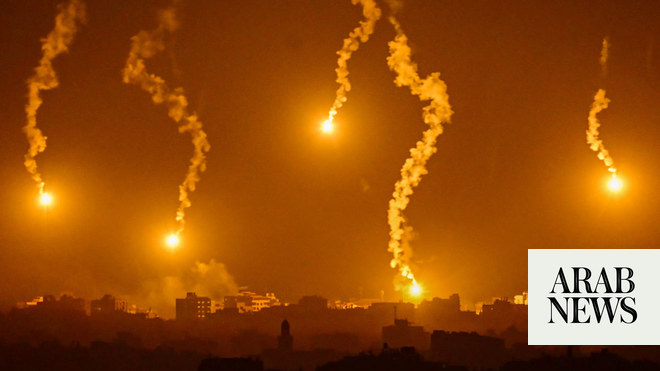
Iran and Israel appear to be content with the tentative outcome of what amounted to saber-rattling rather than open war. Israel misjudged by bombing Iran’s consulate in Damascus on April 1, triggering a calculated, direct and decisive retaliation by Tehran on April 13. And when Israel finally responded a week later, firing missiles against air defense systems close to sensitive nuclear facilities in Isfahan, it appeared that the threat of war had been averted. Israel came under US pressure to tone down its response, while Iran belittled the Israeli attack and declared that no reply was needed. The direct and grave showdown is, for now, over.
The two sides have decided to go back to the shadow war that has been raging for years. Iran is again relying on its proxies in Iraq, Syria, Yemen and Lebanon to engage the Israelis, while Tel Aviv is satisfied to revert to targeting these proxies both openly and covertly. On Friday, the military warehouses of a pro-Iran proxy were targeted in Iraq. No one claimed responsibility, including the Americans.
But while the US has managed to rein in the Israelis and stop them from venturing into a wider regional war, Israel is getting ready to ramp up its military campaign in Gaza’s Rafah. Its Western allies continue to implore it not to launch a ground offensive into the heavily populated border town. However, Prime Minister Benjamin Netanyahu and his military have signaled that such an operation is imminent.
And although the world’s attention is back on the carnage in Gaza, following revelations of mass executions in Khan Younis and Nasser Hospital, the tensions along Israel’s northern border are reaching new heights. That front is likely to flare up precipitously in the coming days. Hezbollah decided to attack Israel soon after Tel Aviv launched its war on Gaza in the wake of the Oct. 7 Hamas assault. After nearly seven months, the two sides appear ready for a fiercer and more prolonged battle.
After nearly seven months, the two sides appear ready for a fiercer and more prolonged battle
Osama Al-Sharif
Tit-for-tat skirmishes have resulted in a heavy toll for both sides. More than 200,000 Israelis have been evacuated from their homes since Hezbollah started bombing northern Israel. The pro-Iran proxy has mostly abided by the so-called rules of engagement by directing its attacks within a 10-km stretch, but as Israel’s reprisals went deeper into Lebanon and hit harder, Hezbollah began hitting further into northern Galilee, including the city of Safed.
Israel’s strikes have resulted in at least 250 Hezbollah casualties, including key field leaders. Thousands of Lebanese civilians have had to leave their homes in the south of the country. Israeli bombing has resulted in severe devastation, while Hezbollah has concentrated on attacking sensitive Israeli tracking and listening installations.
With a confrontation with Iran off the agenda, Netanyahu and his war Cabinet are now committed to neutralizing the threat from the north. Netanyahu is facing pressure from a polarized Israeli public over his failure to conclude a deal to return the hostages held by Hamas. His war on Gaza does not appear to be fulfilling any of the declared goals. On the contrary, the mission has burdened Netanyahu and his army. The world has turned against Israel and is now blasting it for creating an unprecedented humanitarian catastrophe in Gaza.
The political fallout of Gaza has been disastrous for Israel. It now faces genocide charges at the UN’s highest court and the International Criminal Court may be forced to levy charges against Netanyahu and the top army brass. A number of European countries are on the verge of recognizing the state of Palestine. The American public is turning against Israel and the Zionist grip over US politicians.
Netanyahu is once more under pressure to call for early elections, which he will undoubtedly lose to his rival Benny Gantz. He desperately needs to regroup and turn retreat into an attack. He is not alone in believing that a war on Hezbollah could turn things round. Netanyahu’s government has been under pressure to resolve the fate of the thousands of Israelis who have become displaced as a result of the low-intensity war in the north. These people demand to be allowed to go home.
The Israeli self-defense card would work much better against Hezbollah than in the beleaguered Gaza Strip
Osama Al-Sharif
Also, it was Hezbollah that broke a tentative truce in the north and breached a UN resolution to stay away from the common border area. The Israeli self-defense card would work much better against Hezbollah than in the beleaguered Gaza Strip. A strong retaliation against Hezbollah would not receive much objection from Israel’s Western allies. It is a case of self-defense, with Israel in a position to present itself as the victim.
Added to this is the fact that Lebanon is deeply divided over Hezbollah’s latest gambit. Aside from its local allies, the Maronite Christians and the Lebanese Forces are becoming openly hostile to Hezbollah holding Lebanon’s future hostage.
On the other hand, a full-fledged war against Hezbollah would open a Pandora’s box for Israel. The pro-Iran militia is tenfold stronger than Hamas and has prepared itself for all sorts of scenarios. It can retaliate with full force against an Israeli attack and could strike cities deep into Israel. It also has access to Iranian logistical support, unlike Hamas.
In recent days, Israeli war Cabinet member Gantz has highlighted the challenges the Lebanese front presents, stating that it requires “urgent attention.” “We have not yet achieved all the objectives of the war, but we have not given up on any of them,” he said. Gantz also emphasized: “The decisive moment is approaching on the northern front at the border with Lebanon.” He reassured residents of northern Israel that the “moment of truth” is approaching in terms of how to proceed militarily against Hezbollah.
Hezbollah has been upping the ante recently, indicating that it is not backing down, making a possible showdown even more likely.
Iran’s position on an open war between Hezbollah and Israel remains cryptic. Iranian Foreign Minister Hossein Amir-Abdollahian has not mentioned Hezbollah in a few weeks, but has said that Israel needs to end its crimes against Gaza. What that means is anyone’s guess. Would Iran come to Hezbollah’s rescue if Israel were to wage a total war against south Lebanon? And what would that help look like? Iran is unlikely to risk an open war with Israel and will instead rely on its proxies to keep Israel engaged.
But the case for an Israeli attack on Lebanon is getting ripe. Netanyahu needs to deflect attention from Gaza and the aborted hostage deal. A war on Lebanon could provide that. It would be a calculated risk that he and his allies and rivals seem willing to take.
Osama Al-Sharif is a journalist and political commentator based in Amman. X: @plato010












